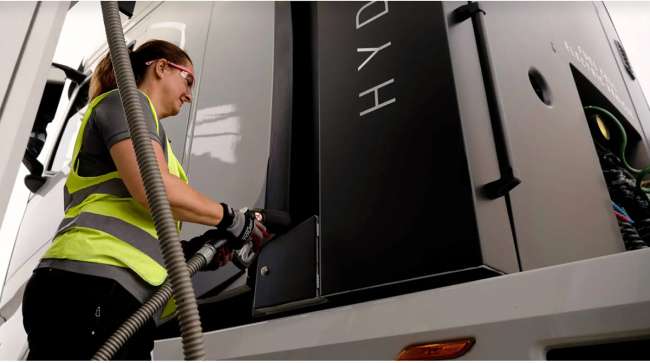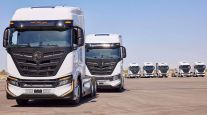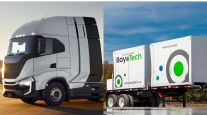Staff Reporter
Nikola Advances Hydrogen Refueling Infrastructure Buildout

[Stay on top of transportation news: Get TTNews in your inbox.]
Nikola Corp. has taken steps forward in building refueling infrastructure for its Class 8 Tre hydrogen fuel cell electric tractors.
The Phoenix-based manufacturer’s Ontario, Calif., refueling station began servicing customers’ trucks as well as units in its demonstrator fleet, and the company in December inked a 10-year agreement with FirstElement Fuel to refuel Tre semis at a hydrogen refueling station in Oakland, Calif.
The Ontario facility is a modular setup that can refuel 25 trucks a day, and refueling can be carried out in 20 minutes, Nikola said.
“Because we’re in full production, we’re utilizing and we’ve expanded the Ontario facility to accommodate the continuation of demos, but also to accommodate customer fueling … now that they own the trucks and have put them into service,” Nikola Energy President Joseph Cappello told Transport Topics. “We’ve been utilizing [Ontario] mainly …. for potential customers to demo the truck. They would come in during their demo process, and that’s what it was predominantly used for.”
By the end of the first half of this year, Nikola expects to have seven refueling locations online. It aims to roll out up to 60 stations nationwide in the coming years, it said.
“The goal is to use the modular stations as a mechanism to build up demand in markets where customers need the fueling and then over time be able to have permanent stations be built or existing truck stop stations add hydrogen refueling at their locations,” Cappello said. “We’re trying to create incentives and de-risk, if you will, and accelerate the investments to make heavy-duty stations more possible.”
FirstElement is in the process of installing several refueling stations capable of fast-filling Class 8 trucks. The Oakland facility “is expected to have really the latest and greatest station technology that’s being seen out there in the marketplace,” said Cappello. The station can service 100 trucks per day.
“It is not a complicated fueling, however, it’s new,” he added. “What we want to do is demystify the differences between fueling at a diesel station with a hydrogen station and show just how safe it is and how easy it is.”
Ben Gardiner, a cybersecurity expert at the National Motor Freight Traffic Association, shares practical, effective strategies to shield your business. He offers insights into operating systems and a comprehensive guide to cyber resilience. Tune in above or by going to RoadSigns.ttnews.com.
Cappello, who joined Nikola in September, is tasked with overseeing the infrastructure expansion, meeting the company’s supply needs and developing Nikola’s Hyla refueling ecosystem brand.
“My job is to not be the bottleneck and to get out there and make sure we have plenty of infrastructure,” he told TT.
Cappello has a track record with hydrogen fueling infrastructure; as CEO of Iwatani Corp. of America, he oversaw construction of a light-vehicle network for Toyota Corp. to support the Japanese company’s Mirai sedan.
Nikola has secured enough hydrogen to meet customer needs in 2024, the company said.
The company produced 42 trucks last year, 35 of which went to the wholesale market. Serial production of the FCEV began July 31, 2023. The trucks are assembled in Coolidge, Ariz.
Want more news? Listen to today's daily briefing above or go here for more info
Nikola said that of the seven non-wholesaled trucks, three are in a field test with a carrier, two are in what Nikola terms “continued validation and engineering” and two are being used for service training/customer demos.
Another Nikola priority for 2024 is resurrecting its battery-electric truck, CEO Steve Girsky told TT in a December interview. In May, the company stopped production of the Tre BET to retool the Coolidge plant ahead of the launch of the FCEV. Since then, however, battery recalls have vexed the truck; in August, all 209 of the Tre BETs sold or sent to potential customers for testing were recalled. The truck is set to resume production this year, and Girsky said Nikola continues to receive orders for the model.





